Lectures
Below are short versions of lectures delivered at the Library. All registered readers receive invites to the full-length lectures and there are about six lectures per annum. Get your free membership here.
Library of Mistakes Podcast

Videos

Tales of the unintended – Dr.Roger Miles
Since the dawn of civilisation, the people tasked with governing have tried to frame rules to stop other people misbehaving. For just as long, those who are governed – whether individuals, institutions, sectors, or technology makers – have managed to break the rules, with often catastrophic results. If the aim of governance is (mostly) ‘the…

Angus Tulloch on booms and busts in emerging markets
View one of Scotland’s investment greats telling Charles Heenan about his career and the ups and downs of being a trailblazer in emerging markets.

Banks – a confidence trick that works… most of the time
Could we get a better panel to talk about banks? Iceland banking chronicler Jared Bibler, HBOS collapse expert Ray Perman and writer on RBS turmoil Ian Fraser — all under the chairmanship of renowned author Sir Philip Augar. We’re delighted to share this video from our recent Weekend of Mistakes at Hay-on-Wye, a joint production…

A Night Cap – Paul Kosmetatos on the Leith Whisky Bubble of 1898 at the Weekend of Mistakes
We’re delighted to share this video from our recent Weekend of Mistakes at Hay-on-Wye, a joint production between The Library Of Mistakes and Hay Castle Trust. Video: Paul Elkington

Daniel Peris on The Ownership Dividend
A must attend event for anyone interested in portfolio management, we were truly honoured to have someone of the stature of Daniel Peris visit us from Pittsburgh for the European launch of his new book, The Ownership Dividend. Daniel is not only a savvy and highly regarded investor, he is also an historian who started…

Mistake of the Year Awards
On the 7th of February 2024, we held the society event of the year in Edinburgh! This was the society event of the year in Edinburgh, and made even more special by it being for the inaugural “Russell’s” — the awards for the biggest mistakes of the year in the finance sector. At this event, Keeper…

Max Ward – My Mistakes as a Fund Manager
Mistakes are our passion at our wonderful library – most of the time it’s someone opining on the errors of others but every so often we get an individual confident enough to talk freely about their own experiences. As a Christmas treat, we had such an event on 4 December 2023 when Max Ward discussed…
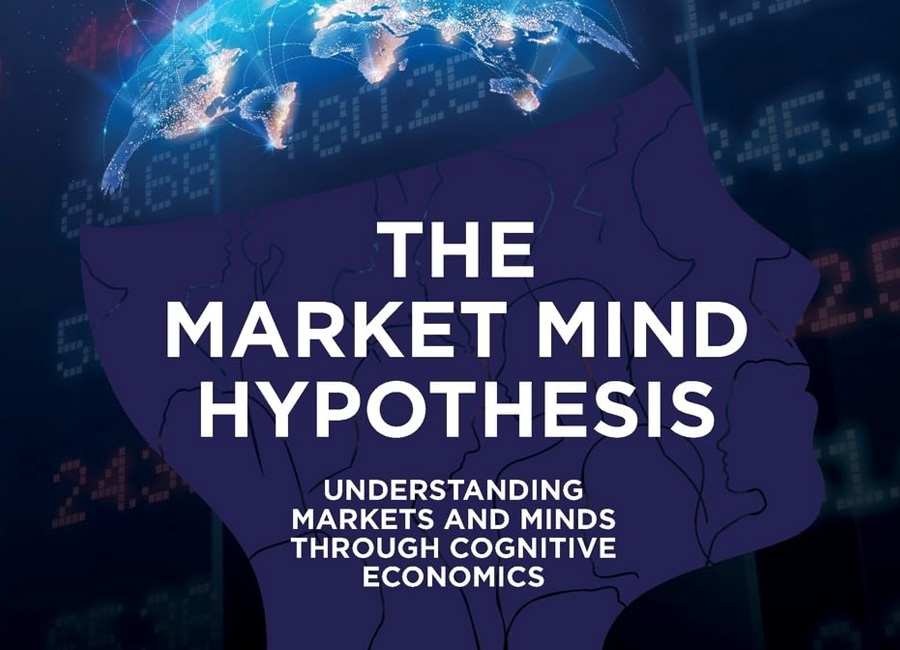
Patrick Schotanus – The Market Mind Hypothesis
We are very proud to support the Market Mind Hypothesis and its proponent Dr Patrick Schotanus — a project going from strength to strength, attracting interest from thinkers and market participants around the world. The Market Mind Hypothesis is a truly novel theory pushing the frontiers of how we understand markets, filling in the gaps…

Charles Williams and Andrew Speirs – The Iceland Banking Saga – Fixing The Calamity
On 2 November we hosted another event about the Iceland Banking Saga. In October 2008, Iceland’s three major banks went bankrupt after a decade of rapid growth and international expansion. Over one weekend, the Government had to extract and support three new domestic banks to protect its financial system. Charles and Andrew led the advisory team…

Rachel O’Dwyer – Tokens
We were delighted to welcome Rachel O’Dwyer, author of Tokens to the Library of Mistakes. We’ve all heard how traditional money is being replaced by new types of methods of exchange. Digital platforms are issuing new kinds of money-like things: phone credit, shares, gift vouchers, game tokens, customer data—the list goes on. But what does…
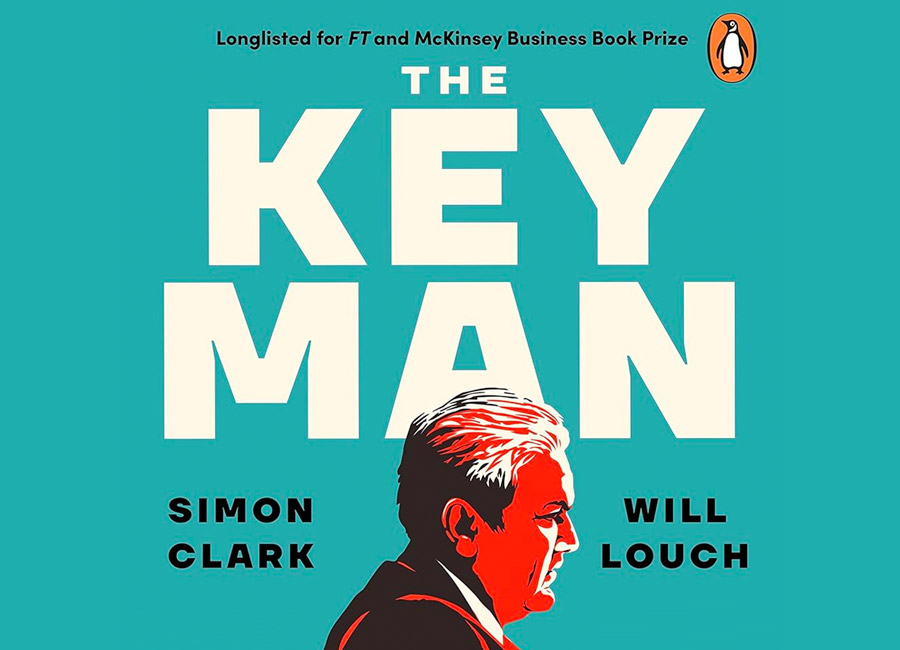
Simon Clark – The Key Man
The audience at The Library of Mistakes was captivated by renowned investigative journalist Simon Clark, who led the discussion about one of history’s most significant fraud allegations. Arif Naqvi was a visionary with an immeasurable dream: to end world suffering, poverty, and disease. His aspiration was to channel capitalism as a force for good, progress,…

Philip Roscoe – How to Build a Stock Exchange
Dr Philip Roscoe from the University of St Andrews spoke on ‘How to Build a Stock Exchange’. Our financial markets are full of contradictions. They are ubiquitous, sophisticated, and timeless, yet chaotic, messy and contingent. All-knowing – almost magical – they are a conjurer’s contraption of cogs and wires. In this lecture, Philip opens the black box of…

Martin Lees – Managing Systemic Challenges in a new Era of World Affairs
We were delighted to present on 15 March, in conjunction with Fettes College, Martin Lees speaking on Managing Systemic Challenges in a new Era of World Affairs. Mindful of our place in Edinburgh, this talk considered the legacy of philosophers and economists such as David Hume and Adam Smith and linked this into our present-day…
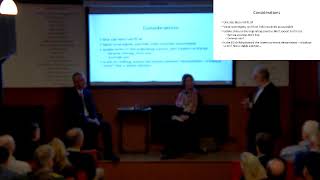
Bob Traa – Challenges to stability and macroeconomic development: the case of the European Union
Bob Traa, who has spent much of his career visiting locations of economic turmoil to report back to the International Monetary Fund, gave this presentation in the library on 21 February 2023.

Invested – How Three Centuries of Stock Market Advice Reshaped Our Money, Markets, and Minds
Paul Crosthwaite, Peter Knight, Nicky Marsh, Helen Paul and James Taylor talked about their book Invested – How Three Centuries of Stock Market Advice Reshaped Our Money, Markets, and Minds. Invested tells the story of how the genre of investment advice developed and grew in the United Kingdom and the United States, from its origins in the eighteenth century…

Philipp Roessner – Managing the Wealth of Nations
Philipp Roessner, Professor of Early Modern History at the University of Manchester, spoke on Managing the Wealth of Nations. Early Modern Visions of Commerce and Capitalism, and the Making of Economic Development. He discussed some new recent departures in the history of political economy, showing that early modern economic theory was in many ways close to modern…

John Kay – Radical Uncertainty: Decision-making for an unknowable future
John Kay discussed his book co-written with Mervyn King; Radical Uncertainty: Decision-making for an unknowable future, drawing on biography, history, mathematics, economics and philosophy to highlight the most successful methods of dealing with an unknowable future.
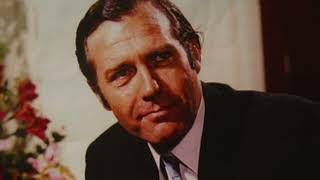
Sir Philip Augar John Stonehouse: Spy, fraudster, banker?
Philip talked about his new book; Agent Twister: The true story behind the scandal that gripped a nation, that he has co-authored with Keely Winstone. John Stonehouse was a cabinet minister, a Czech spy, a fraudster, a philanderer and a putative banker. In 1972 Stonehouse established the British Bangladesh Trust (BBT) which aimed to become…
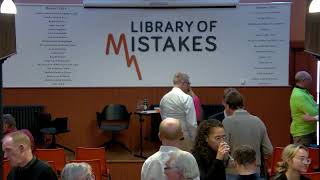
Edward Chancellor The Price of Time
Edward Chancellor is an author, journalist and former fund manager at the Boston investment firm GMO. His new book The Price of Time: The Real Story of Interest is a detailed analysis of the history of interest rates and also an attack on current thinking, particularly amongst central bankers, about the role of interest rates…
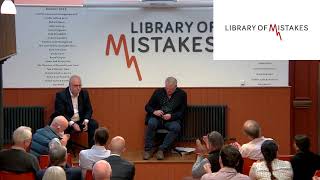
Sandy Nairn The End Of The Everything Bubble
Sandy discusses his new book The End of The Everything Bubble and then the likely aftermath of that end in discussion with Russell Napier. Markets appear to be going up and up, but they have got perilously ahead of themselves. Danger lies in every single investable asset class. What some have called the ‘Everything Bubble’…
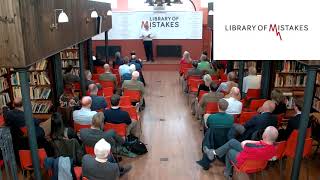
Russell Napier The Asian Financial Crisis 1995-98: Birth Of The Age Of Debt
On the evening of April 29th at The Library of Mistakes Edinburgh, The Keeper (Russell Napier) provided a lecture on his new book The Asian Financial Crisis 1995-98: Birth Of The Age Of Debt. Written from the perspective of someone working in finance during the period, living in Hong Kong, the book focuses on investors’…

Alistair Darling Opening of the Library of Mistakes
Alistair Darling was Chancellor of The Exchequer during one of the most dramatic periods of global financial history – June 2007 to May 2010. He oversaw the rescue of the British banking system and coped with the financial aftermath of that crisis. Lord Darling made some introductory comments and then was interviewed by Ray Perman…
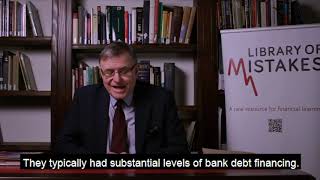
Professor Andy Adams The Split Capital Investment Trust Crisis
The crisis surrounding the split capital investment trust sector broke in late 2001. It led to a major Financial Services Authority investigation and a House of Commons Treasury Select Committee inquiry that called as witnesses a number of well-known personalities from the investment trust industry. As interest rates fell in the final years of the…

Ray Perman The Rise and Fall of The City of Money: A Financial History of Edinburgh
A few months after posting record results a major Scottish bank goes bust, impoverishing many of its shareholders and depressing the whole economy. Is this 2008? No it is 130 years earlier – and despite the similarities with the 21st century credit crunch, there are differences. One is the speed with which the authorities acted:…
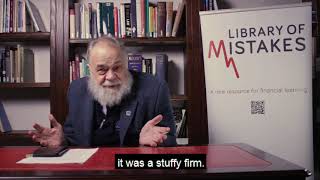
Chris Swinson Gerard Lee Bevan, Fraud And The Crash of 1920
Gerard Lee Bevan was guided to become a stockbroker – benefitting from a family introduction to Ellis & Co, one of the oldest and stuffiest stock exchange firms where he became a partner. Bevan and some associates acquired an insurance company and used the funds to finance the promotion of new share issues. They made…
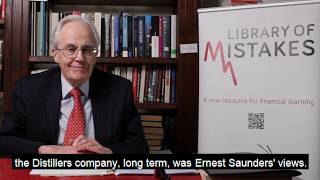
Scott Dobbie The Guinness Bid for Distillers
This lecture by Scott Dobbie was on the dramatic events surrounding the bid by Guinness for the Distillers Company in 1985. The Guinness acquisition of Distillers Company which took place in the mid-1980s was the last major bid before ‘Big Bang’. The instigator was incoming professional management to Guinness which bought first Bells Scotch Whisky,…
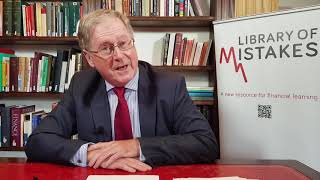
John Newlands Robert Fleming (1845-1933) – Financial Entrepreneur, Benefactor, Dundonian
Robert Fleming left school at 13 to work as an office boy for a salary of £5 per annum. Before he was 28, Fleming had pioneered the launch, in Dundee, of the Scottish American Investment Trust, still trading today as Dunedin Income Growth Investment Trust and managed by Aberdeen Standard Investments. He went on to…
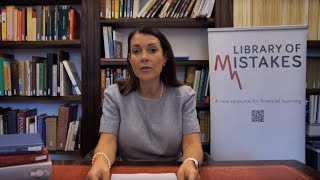
Claire Anderson The Origins of the Scottish Investment Trust Industry c.1870-1914: Dundee as a Centre of Investment
Claire Anderson introduces The Origins of the Scottish Investment Trust Industry c.1870-1914: Dundee as a Centre of Investment. As part of her doctoral thesis, Claire studied the origins of the Scottish Investment Trust industry and the role that Dundee played in this. In this lecture Claire explains the links between the jute merchants of Dundee…

Forrest Capie Can History Guide us to a Better Financial System?
Professor Capie argues that there developed in Britain, in the course of the nineteenth century, a financial system that was safe, stable, and effective. It derived from a learning process that involved the banks, the central bank, and the authorities. A system evolved where the banks knew how to behave, the central bank knew how…

Philip Augar The Bank That Lived A Little: Barclays in the Age of the Very Free Market
The Bank that Lived a Little describes three decades of boardroom intrigue at one of Britain’s biggest financial institutions. It is a tale of feuds, grandiose dreams and a struggle for supremacy between rival strategies and their adherents. The disagreement between those ambitious for Barclays to join the top table of global banks, and those…
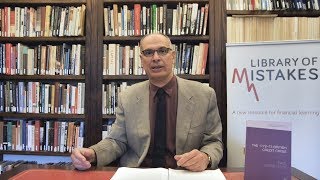
Dr Paul Kosmetatos Scottish Banking and the 1772-1773 Banking Crisis
The 1772-1773 credit crisis, with its disproportionately severe impact in Scotland highlighted by the collapse of the large and ambitious Ayr Bank (Douglas, Heron & Co.) has always struck a contrarian note to this last part of the argument. In this lecture Paul Kosmetatos, focusing on the crisis of 1772-1773, seeks to refute the case…

Ray Perman Sir Walter Scott – His Financial Rise & Fall
A lecture at the Library of Mistakes by Ray Perman entitled Sir Walter Scott – His Financial Rise & Fall. In 1825 Sir Walter Scott was at the height of his powers. His day job, as a principal clerk to the Court of Session, paid well and left him considerable time to write. He was…
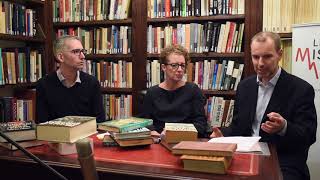
Paul Crosthwaite, Nicky Marsh & Peter Knight: A History of Financial Advice Literature
A new collection at the Library of Mistakes with Paul Crosthwaite, Nicky Marsh and Peter Knight. The History of Financial Advice collection has been assembled to highlight the most important, influential, and distinctive popular guides to finance and investment published over the past three centuries. In their presentation, the project team discuss how they went…
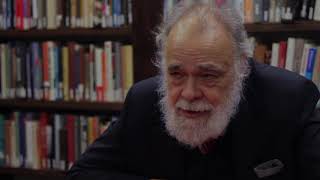
Chris Swinson A financial biography of Clarence Hatry
I am unable to imagine any worse case than yours.’ With these words, in January 1930, a judge sentenced Clarence Hatry to a prison term of 14 years. On discovery of an outrageous fraud, Hatry’s companies had collapsed causing a crash on the London stock market which reverberated in New York and precipitated the Wall…
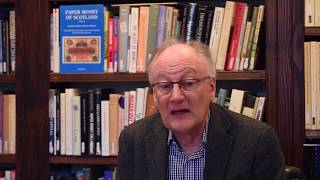
Jonathan Callaway Paper Money of Scotland
This is the story of Scotland’s physical money in three phases – The Past, The Present and The Future. It will illustrate how trust was won, lost, regained and (nearly) lost again. It touches on the importance of maintaining confidence in that most basic form of finance and it will look to the future of…

Dr Gareth Campbell The Rise and Return of Investment Trusts, 1868 to Today
Investment trusts were the first investment vehicles to enable middle class investors to easily and cheaply diversify their holdings. Using 150 years of monthly data, on hundreds of trusts, we analyse how they have moved from having mainly idiosyncratic risk to being heavily exposed to systematic risk. We find that trusts which were more exposed…
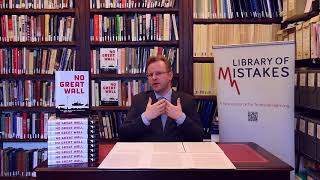
Dr Felix Boecking Trade, Tariffs, and Nationalism in Republican China, 1927–1945
Listen to the lecture and Q&A audio here The book is an in-depth study of Nationalist tariff policy in China, fundamentally challenging the widely accepted idea that the key to the Communist seizure of power in China lay in the incompetence of Chiang Kai-shek’s Nationalist government. Dr Felix Boecking is a senior lecturer in modern…
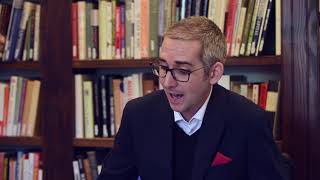
Paul Crosthwaite The Relationship between Literature and Economics
This lecture examines the early twentieth-century culture of popular investment advice in the United States, focusing on its relation to the defining financial event of the era: the Wall Street Crash of 1929. Manuals, guides, and handbooks for the amateur investor (or speculator) flooded the market in the decade prior to the Crash, and the…

Dr Paul Kosmetatos The Failure of Pattison’s Whisky
On 3 December 1898, Pattisons’ Whisky, an established family blending business stopped payment just over two years after it had floated a minority of its share capital to the public. The company’s minority shareholders and the receivers brought in to manage its affairs initially expected this to be a minor liquidity crisis of an otherwise…

Craig Turnbull A History of British Actuarial Thought
Insurance companies’ investment strategy choices and constraints and the financial, actuarial and regulatory thinking that determine them have, of course, changed greatly over the last 200 years. But environments somewhat similar to today’s low-for-longer world have been seen before, and some contemporary investment ideas have a historical provenance that is perhaps surprisingly long. Craig presents…
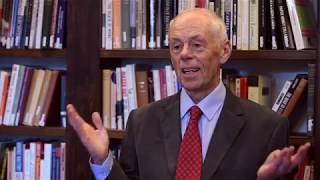
Donald MacKenzie A Material Political Economy: The High-Frequency Trading of US Shares
Ultrafast, automated ‘high-frequency trading’ or HFT now makes up around half of all US share trading. Drawing upon interviews with 54 high-frequency traders, MacKenzie examined the elaborate ‘dances’ of trading algorithms and the ‘signals’ (patterns of data) that shape those dances. MacKenzie revealed the feature of the US political system that underpins ‘futures lead’, and…
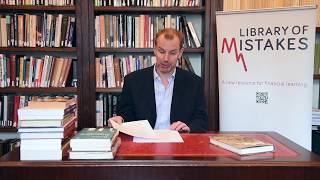
Dr Peter Knight Reading the Market: Genres of Financial Capitalism in Gilded Age America.
At the beginning of the twentieth century, only one percent of Americans were invested in the stock market. Yet in the Gilded Age there was an explosion of popular fascination about the market, with a welter of novels, short stories and magazine articles fuelling the emergence of a daily culture of market watching. In short,…

Tom Ward The Collapse of the City of Glasgow Bank
The collapse of the City of Glasgow Bank in 1878 was one of the most severe tests ever of the British banking system – and arguably, was passed remarkably well with the miscreants punished, lessons learned, and the system strengthened. Yet today, it is hardly known. This is a terrible arrogance on our part –…
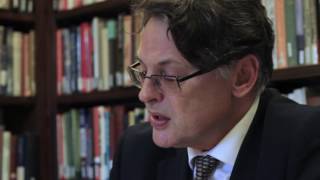
Dr Michael John Oliver British Monetary Policy in the 1960s: A Reassessment
Until the advent of floating exchange rates in the early-1970s, British macroeconomic policy after 1945 has generally been characterised by economic historians as operating within a fixed exchange rate regime. Because the authorities were muddled about their aims and confused about how to achieve them, they stored up problems which became particularly acute during the…
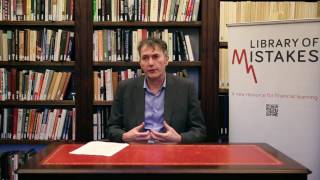
Douglas Watt John Law and the Mississippi Bubble
Law was a financial innovator, monetary theorist, gambler and art collector, as well as being described as ‘one of the greatest promoters of despotism ever seen in Europe.’ The son of an Edinburgh goldsmith, he became Comptroller General of France in 1720. But the bursting of the Mississippi Bubble, which Law’s ‘System’ had inflated, ended…
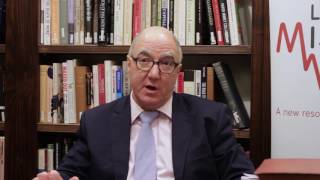
Richard Roberts When Britain Went Bust
Britain’s 1976 IMF crisis marked the nadir of the country’s post-war relative economic decline. Dramatic elements included a plunging pound and a ‘gilts strike’; the Chancellor’s turnaround at Heathrow and his confrontation with Labour’s left-wing; the arrival in London of a shadowy IMF mission and a personal intervention by the Managing Director; well-leaked cabinet divisions…
Books
The Populist Tempation Professor Barry Eichengreen
The Bean Counters Richard Brooks
HBOS talk Professor Atul K Shah
Hong Kong’s Link to the US Dollar John Greenwood
The Library of Mistakes Course
Advanced Valuation in Financial Markets
The online version of our renowned course, is available for both finance professionals and nonprofessionals.
As featured in the Financial Times
In conjunction with Heriot-Watt University


